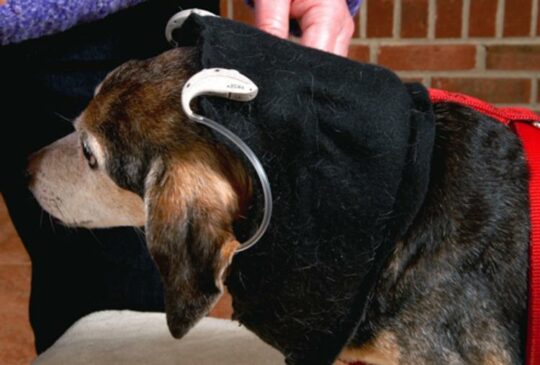Dogs are often hailed as man’s best friend, providing companionship, loyalty, and joy to our lives. However, just like humans, they can face health challenges as they age, notably hearing loss. As pet owners, it is our responsibility to ensure their well-being, leading to the emergence of innovative solutions like dog hearing aids. In this article, we will explore the world of dog hearing aids, shedding light on how they work, their benefits, and how to choose the right one for your furry friend.

dog hearing aids
Understanding Hearing Loss in Dogs
Hearing loss in dogs can result from a variety of factors, including age, genetics, and exposure to loud noises. Just like humans, dogs can experience gradual hearing deterioration, sometimes making it difficult for them to respond to commands or even notice when a family member enters the room.

dog hearing aids
Signs of Hearing Loss in Dogs
Identifying the signs of hearing loss in your dog is crucial for early intervention. Common indicators include:
- Increased Startle Response: If your dog jumps more easily when surprised, they may be struggling to hear approaching sounds.
- Lack of Reaction to Commands: Dogs who once responded promptly to commands may ignore them, suggesting hearing difficulties.
- Changes in Barking: A noticeable change in pitch or volume could be an indication of hearing loss.
- Difficulty Locating Sounds: Dogs often use their sharp hearing to locate sounds; if your dog seems disoriented or confused about where sounds are coming from, a hearing assessment may be needed.
By observing these behaviors, you can determine whether your dog might benefit from hearing aids.
Causes of Hearing Loss in Dogs
There are several factors that contribute to hearing loss in dogs, including:
- Genetics: Some breeds are more predisposed to hearing problems than others. For example, Dalmatians are known to have a higher incidence of deafness due to genetic predisposition.
- Noise Trauma: Loud environments or exposure to intense sounds can lead to temporary or permanent hearing loss. Fireworks, gunshots, and loud music are common culprits.
- Aging: As dogs grow older, associative hearing loss may occur, impacting their ability to detect sounds.
The Importance of Dog Hearing Aids
With advancements in veterinary technology, dog hearing aids represent a significant step forward in canine health care, providing a means for dogs to regain their hearing and reconnect with their surrounding world.
Functionality of Dog Hearing Aids
Dog hearing aids are specifically designed to amplify sounds for hearing-impaired dogs. Equipped with microphones and speakers, these devices capture sound waves, enhance them, and then deliver the amplified sounds directly into the dog’s ears. Unlike human hearing aids, pet-specific designs account for the unique anatomy and behavior of dogs, ensuring comfort and effectiveness.
Benefits of Using Hearing Aids for Dogs
- Improved Quality of Life: By enhancing their auditory capabilities, hearing aids can significantly improve a dog’s engagement with their environment. They can hear family members calling, making them feel more connected and secure.
- Better Training and Communication: Hearing aids can facilitate training since dogs can better respond to commands, enriching both the pet-owner relationship and the learning experience.
- Increased Safety: A pet that can hear better is less likely to run into dangers, such as approaching vehicles or unfamiliar animals, thus enhancing their overall safety.
Choosing the Right Hearing Aid for Your Dog
When it comes to selecting the right hearing aid for your dog, it’s crucial to consider the following factors:
Consultation with a Veterinarian
Before investing in a hearing aid, consult with a veterinarian who specializes in audiology. They can perform thorough diagnostics to assess the extent of your dog’s hearing loss and recommend suitable devices based on their specific needs.
Types of Hearing Aids
There are several types of hearing aids available for dogs. Options may include:
- Conventional Hearing Aids: Traditional models that amplify sound, similar to those used by humans.
- Bone Conduction Aids: Designed to transmit sound vibrations through the skull, these can be effective for dogs who have conductive rather than sensory hearing loss.
- Digital Hearing Aids: These advanced models use microchips to filter and amplify sounds, offering customizable settings based on the dog’s environment.
Fit and Comfort
Ensuring that the hearing aid fits comfortably is crucial. A poorly fitted device can cause discomfort or irritation, reducing the likelihood of your dog wearing it. Many manufacturers offer various sizes and styles, so be sure to explore options that suit your dog’s breed and size.
Frequently Asked Questions (FAQs)
1. Can all dogs benefit from hearing aids?
Not every dog may require hearing aids, as the need depends on the severity of their hearing loss. Consulting a veterinarian for a proper evaluation is essential.
2. How do I know if my dog needs hearing aids?
Watch for signs such as ignoring commands, increased startle response, or difficulty locating sounds. If you notice these behaviors, schedule a veterinary evaluation.
3. Are dog hearing aids expensive?
The cost can vary depending on the type and brand of the hearing aid. Conventional models may be more affordable, while digital hearing aids can be more expensive due to advanced technology.
4. How long does it take for dogs to adjust to hearing aids?
Adjustment periods can vary. Some dogs may adapt quickly, while others may take time to become comfortable with the new sounds. Patience and gradual acclimatization are key.
5. Can I train my dog to use hearing aids?
Yes! Training is often a gradual process that involves repeated exposure and positive reinforcement to help your dog feel at ease with their hearing aids.
6. How do I clean and maintain dog hearing aids?
Regular cleaning is essential to keep the devices in good condition. Follow the manufacturer’s instructions, which typically include gentle cleaning methods with dry cloths and periodic professional check-ups.
7. Can hearing aids completely restore my dog’s hearing?
While hearing aids can significantly improve sound perception, they may not totally restore hearing. The effectiveness depends on the underlying cause of the hearing loss.
8. Where can I find dog hearing aids?
Dog hearing aids are available from specialized veterinary clinics or online retailers that focus on pet health care products.
Conclusion: A New Hope for Hearing Impaired Dogs
Dog hearing aids represent a remarkable advancement in animal health care. By amplifying sounds, these devices provide a pathway for dogs with hearing loss to reconnect with their surroundings, enjoy a better quality of life, and strengthen their bond with their owners. If you suspect that your furry friend is struggling with hearing challenges, consulting with a veterinarian can help identify the best solutions available. A hearing aid may just unlock a world of sound for your beloved pet, allowing them to thrive and enjoy life to the fullest once more.